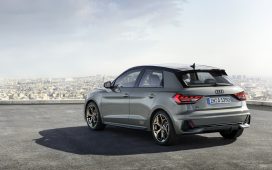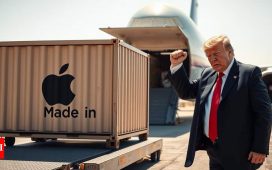- Toyota and Lexus revealed five new electric cars for the U.S. last week, some of which will go on sale in the fall and the others by early next year.
- Two additional EVs are in the pipeline for the American market. They will be U.S.-made and use locally sourced batteries.
- The automaker said it doesn’t want to “give up” to competition and sees EV sales growth on the horizon.
Toyota’s two bestsellers, the Camry and the RAV4, are going hybrid-only. Every trim of both models will now include an electric motor and a lithium-ion battery, easing the load on the gas engine and cutting emissions, without changing how owners road-trip or refuel.
But that’s just the start of a broader electrification push as it prepares to launch multiple fully electric models over the next couple of years.
Toyota is gearing up to launch seven new fully electric vehicles in the U.S. by 2027, Bloomberg reported Thursday. I saw five of them last week at the company’s North American HQ in Plano, Texas. The lineup includes the refreshed bZ (already reviewed on InsideEVs), the new C-HR, the larger all-terrain bZ Woodland, and two Lexus models: the updated RZ and the all-new ES sedan.
The sixth and seventh models are under wraps for now. But at least one of them is rumored to be a long-awaited three-row electric SUV, which could also be the production version of the 2021 “bZ Large SUV” concept.

But the five models I saw show real promise. The updated bZ now gets over 300 miles of range, stronger performance and more features which could help Toyota drive more volumes. It can even play the same role as the Equinox does for Chevy—assuming it’s priced competitively. And on the luxury side, the refreshed Lexus RZ could serve a similar role to Cadillac’s Lyriq—a stylish, premium EV getting more upmarket buyers into EVs.
Notably, two of the seven EVs will be built in the U.S., likely with locally produced batteries from Toyota’s North Carolina plant. The first is expected to be that three-row SUV; the second is a mystery, for now.
But by 2027, when you walk into a Toyota or Lexus dealership, you’ll find a fully electric option in every major segment. That’s part of Toyota’s so-called “multi-pathway approach”: offering gas, hybrid, plug-in hybrid and EV options so customers can pick the powertrain that they think works best for them.
Building two mass-market EVs in the U.S. is a bold bet, especially in today’s political and regulatory climate. The Trump camp wants to roll back EV tax credits and weaken emissions targets, casting a shadow over the already tough economics of EV manufacturing. Outside of Tesla, no automaker has turned a profit on EVs in the U.S., and this remains one of the most capital-intensive bets in the industry.
Still, Toyota is pushing ahead. That likely means the company sees real growth on the horizon. Toyota typically doesn’t commit a new model to production unless it expects to sell 100,000 to 150,000 units a year. But in this case, if its EV sales fall short, it’ll export the vehicles to markets where demand is strong.
“In the future, we think it’s a really important segment that we don’t want to give up to the competition,” Cooper Ericksen, Toyota’s senior vice president of planning and strategy, told Bloomberg.
Competition is indeed growing and Toyota doesn’t want to be left behind. Tesla still commands nearly half the U.S. EV market and has cheaper models coming soon. General Motors, Hyundai, and Kia are all expanding their EV lineups, especially in the crossover and large family SUV segments Americans love. Toyota doesn’t seem keen to let them run away with it.
Have a tip? Contact the author: suvrat.kothari@insideevs.com



